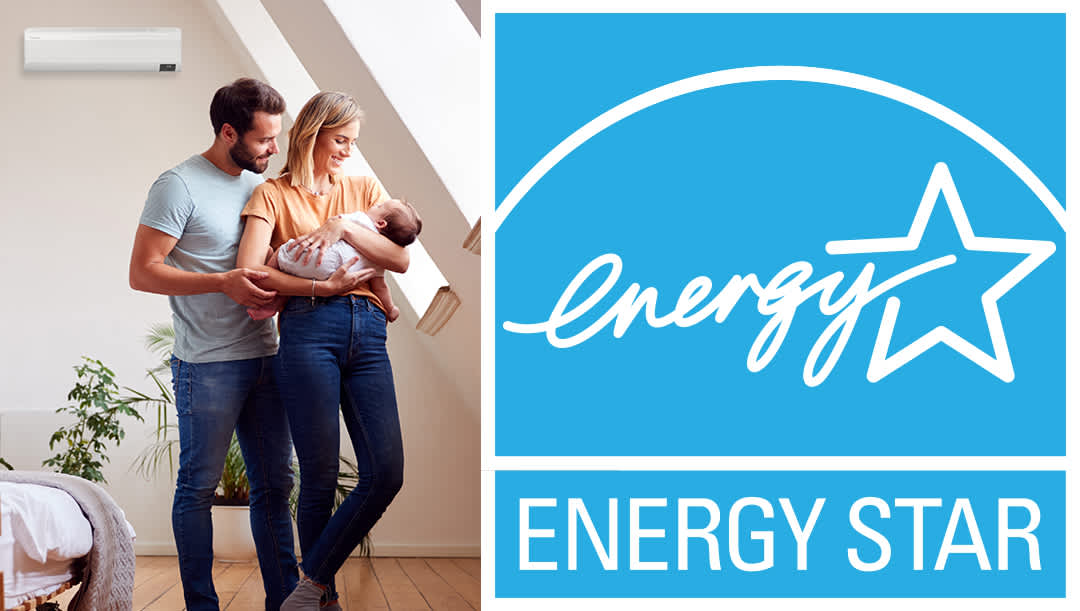HVAC Questions
Common HVAC Questions
Homeowners should understand some basic definitions and principles of heating and cooling systems to properly operate and maintain their HVAC system. Because we explore the unknown to discover technologies to help people lead happier, healthy lives, Samsung brings you the HVAC questions and answers section you've been looking for. Browse through our HVAC FAQs section below to get answers to some of the most common HVAC questions.
-

What is a heat pump?
A heat pump is an air conditioning system, made up of an indoor fan coil (air handler) unit and outdoor compressor. The system provides both heating and cooling. The two most common types of heat pumps are air-source and ground-source. Air-source heat pumps are more popular for residential heating and cooling. In cooling mode, the indoor unit removes undesirable warmth and humidity from the air and transfers it outside. In heating mode, the cycle is reversed, and the outdoor compressor absorbs heat (even cold winter air contains heat) and releases it indoors.
-

What is a mini split?
A mini split is a heat pump system, also known as a ductless heat pump. A mini split serves as an alternative to radiator or baseboard heating, and as a replacement for cooling only window units. No duct work is needed. Instead, a head unit, or multiple head units, are mounted on an interior wall or ceiling, with an accompanying unit outside.
More HVAC Questions & Answers
In this HVAC FAQ section, we provide some general and more specific answers to questions on air conditioning that are intended to simplify the use of our HVAC systems. This HVAC FAQ section is designed to make resources and support easily available. If you can't find the questions on air conditioning you're looking for here, use our HVAC professional locator to find an HVAC contractor in your area for more information or support.
-
What does HVAC stand for?
HVAC stands for Heating, Ventilation, and Air Conditioning.
-
What is an air conditioner?
An air conditioner is a system that is used to cool by removing heat from the space and moving the heat outdoors.
-
What is a SEER rating?
SEER stands for Seasonal Energy Efficiency Ratio. A SEER rating determines the maximum efficiency of an air conditioning unit.
-
How often should I clean or replace my air filter?
You should clean or replace your air conditioning system’s filter every month or two, especially during heavy use months (winter and summer). Filters may need more frequent attention if the air conditioner is in constant use, is subjected to dusty conditions, or if you have fur-bearing pets in the home. A dirty filter will slow down air flow and make the system work harder to keep you warm or cool – wasting energy.
-
What are the most common types of air conditioning products?
The most common types of air conditioning products are central ducted air conditioner, central ducted heat pump, ductless mini split, and multi-split.
-
Why is energy efficiency important?
Energy efficiency is important because in an average size home, air conditioning consumes more than 2,000 kilowatt-hours of electricity per year. This causes the average power plant to emit about 3,500 pounds of carbon dioxide and 31 pounds of sulfur dioxide. Even if your air conditioner is only 10 years old, you may save 20% to 40% of your cooling energy costs by replacing it with a newer, more efficient model.
-

How do ductless mini split air conditioners work?
Ductless mini split air conditioners work by using narrow refrigerant lines positioned outside your home to deliver heating and cooling. This is instead of conventional central heating and cooling which requires bulky and often expensive ductwork. Only a three-inch hole in an outdoor wall is needed for the refrigeration lines to connect the outdoor unit to the indoor unit. The outside unit extracts heat from the air, even when it’s cold. Refrigerant carries the heat directly to the head(s) inside, which then delivers heated air to the occupied space. In warmer months, the system works in reverse for quiet, efficient air conditioning.
-

How do I know if my system qualifies for rebates?
Many utility companies offer big rebates for homeowners that choose an Energy Star® certified product for their HVAC system replacement. Check with your local utility provider for more details or use the Energy Star® Rebate Finder tool. You can also find available rebates for qualifying Samsung heating and cooling systems on our Samsung HVAC Residential Rebate Center.
Select models are Energy Star® labeled. Proper sizing and installation of equipment is critical to achieve performance. Split system air conditioners and heat pumps (excluding ductless systems) must be matched with appropriate coil components to meet Energy Star® criteria. Ask your contractor for details or visit www.energystar.gov.
